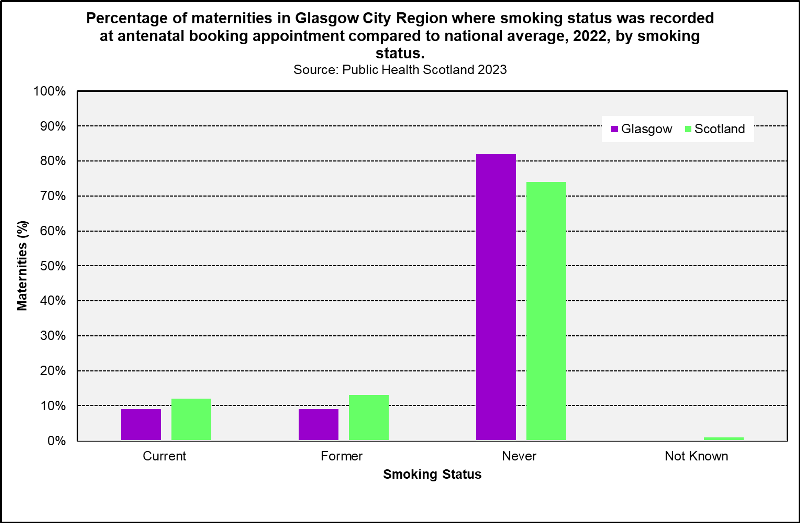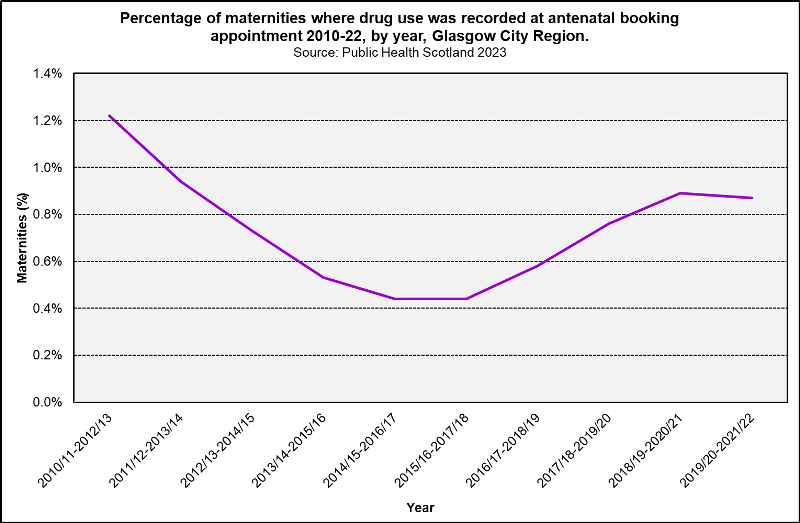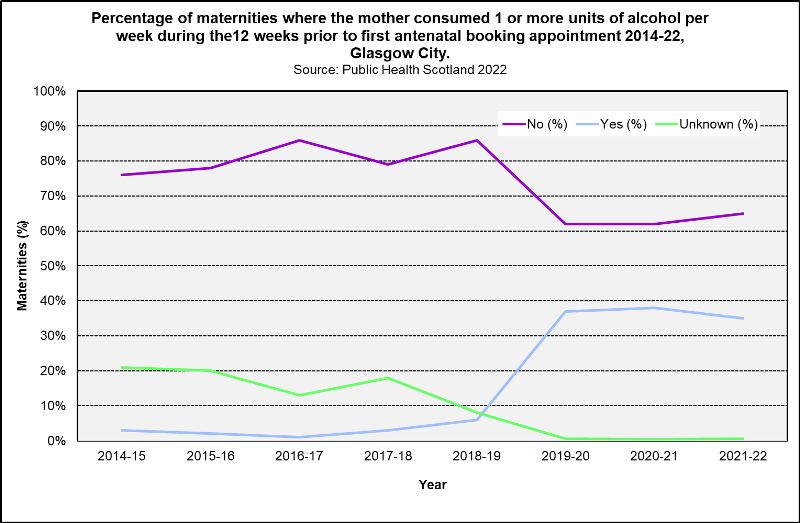Perinatal environment
Smoking during pregnancy
There has been little to no change in mothers' smoking status during pregnancy between 2021 and 2022, in the Glasgow City Region and across Scotland. However, Glasgow continues to have a lower proportion of maternities where smoking status is 'current' or 'former' compared to the national average.
In 2022, 9% of pregnant women in Glasgow reported they were current smokers (compared to 12% across Scotland) and 9% reported they were former smokers (13% across Scotland), and a higher proportion of women in Glasgow had never smoked compared to the national average (82% in Glasgow, 74% in Scotland).

Drug use during pregnancy
The proportion of maternities in the Glasgow City Region where drug use is recorded, has shown an overall, albeit relatively small, decline in the last ten years: from 1.2% to 0.9% between 2010 and 2022. However, figures have risen from a low of 0.4% since 2017-18.

Alcohol intake during pregnancy
In the period 2014-15 to 2021-22 the number of maternities where consumption of alcohol was recorded rose from 3% to 35%. In the same period, maternities where no alcohol consumption was recorded decreased from 76% to 65%, and the number of 'unknowns' decreased from 21% to 0.5%).

While data suggests there has been a considerable increase in drinking during pregnancy since 2014, there are various factors which could account for this trend.
First, from April 2014 questions surrounding alcohol intake during pregnancy were adapted to capture more accurate information. The question now only captures whether a women drank at all during the previous 12 weeks to the booking appointment, which often coincides with the first 12 weeks of pregnancy. However, given that many women may not even know they are pregnant until at 2-4 weeks after conception (at the earliest) then women may be consuming alcohol during their pregnancy, albeit unknowingly and unintentionally, despite perhaps ceasing to consume alcohol once their pregnancy is confirmed.
Secondly, the question does not capture how much alcohol is consumed nor the frequency. While guidance states that women should abstain from alcohol intake during their pregnancy, research shows that women question whether low-level drinking (i.e. 'a sip' or 'a small drink') during pregnancy is acceptable. These findings do not discriminate between low and high-levels of consumption.
Finally, it is possible that the framing of the question "have you drank during the last 12 weeks" is perceived as less judgemental and stigamtising compared to "have you drank during your pregnancy?" or "how much have you drank during your pregnancy?". Therefore women may be more willing to disclose their alcohol intake. Research shows that the stigmatising and patronising element of the guidelines surrounding alcohol consumption during pregnancy may lead to underreporting of consumption.
As with any self-reported data, it may not be accurate nor can it reliably reflect alcohol intake during the remainder of the pregnancy.
Notes
Smoking during pregnancy data is from the Antenatal Booking System dataset. There are only two years of data available at the time of writing.
Maternal drug use data are recorded at the antenatal booking appointment and comprises questions surrounding: 'drug misuse during this pregnancy', 'drugs used', 'and ever injected illicit drugs'.
Alcohol intake data is collected at the antental booking appointment. Women are asked whether they have consumed an average of one or more units of alcohol per week during the last three months.
This page was updated in May 2024.
